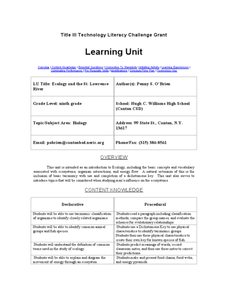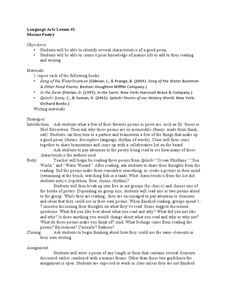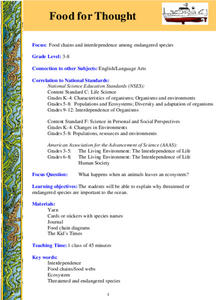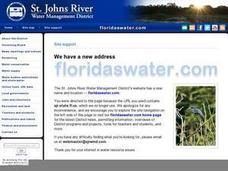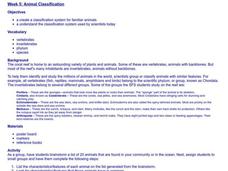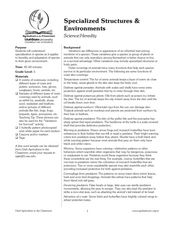Curated OER
Ecology and the St. Lawrence River
Ninth graders complete a unit of lessons on ecosystems, organism interactions, and energy flow. They create a key for known species of fish, diagram the movement of energy through an ecosystem, and create and present food chains and food...
Curated OER
Classy
Students explore the classification system in this seven lessons unit. The diversity of life forms and their characteristics are examined using a microscope. Kingdoms, classes, and families are investigated.
Curated OER
What Makes A Bird A Bird?
Students identify the characteristics of birds and explain how these characteristics are useful in their survival. They explain how both physical and environmental adaptations help birds survive and reproduce. Students create an...
Curated OER
Baleen Whales vs. Toothed Whales
Second graders review mammal characteristics and study two types of whales. In this mammal study lesson, 2nd graders discuss mammals and define their five characteristics. Students complete a whale worksheet and define differences...
Curated OER
Marine Poetry
Students identify characteristics of good poetry and compose their own. For this marine poetry lesson, students are introduced to several different types of poetry with a marine theme. After discussing the elements...
Curated OER
One of These Things is Not Like the Other
Students examine sets of four or five organisms and determine which organism in each set doesn't "belong", and determine a variety of characteristics that explain why it doesn't belong.
Curated OER
Observing and Recording Biological Data
Students create their own definition of life. They identify the eight characteristics of life in organisms. They compare and contrast the characteristics of living and nonliving things.
Curated OER
Vertebrates
Fifth graders examine the traits and characteristics of vertebrates. Identifying the key factors that make the classes of vertebrates unique, they create a children's book. They decide which material is necessary to share about the...
Curated OER
Food for Thought
Young scholars explore the food chains in a variety of ecosystems and its relationship to the survival of threatened or endangered marine animals or fish in the ocean. The interdependence of the species is investigated in this lesson.
Curated OER
Mammals
Pupils examine the characteristics of mammals through video clips, and slide shows. Lesson includes clips of fastest land animal, biggest mammal, loudest mammal and tallest animal.
Curated OER
Animal Classification
Young scholars recognize the six groups of animals (Mammals, fish, birds, reptiles, amphibians and arthropods) and their characteristics. In this animal characteristics lesson, students sort animals by their traits. Young...
Curated OER
Mammals - Habitat/diversity Learning Cycle Lesson Plan
Ninth graders explore the characteristics and diversity of mammals, including key adaptations.
Curated OER
Hypoxia and the Dead Zone in the Gulf of Mexico
Students investigate the causes of hypoxia, the characteristics of a watershed, and how the actions and management practices of people can both negatively and positively affect aquatic ecosystems.
Curated OER
Life at Risk
Students examine the characteristics of the peregrine falcon. They investigate endangered and extinct species, and how the environment affects the process.
Curated OER
Lesson 7 - Our Rivers and Streams
Students examine the major rivers in Northeast Florida and how they are useful. They study the St. John's River, its tributaries, and unique characteristics.
Alabama Learning Exchange
Is That a Whale?
Pupils research the characteristics and examples of the two main types of whales. They work in groups to study the habitats of each type of whale before developing a slideshow presentation of the information.
Curated OER
Acting Like a Bunch of Animals: Fables and Human
The video "The Tales of Aesop" traces for viewers the history of fables and identifies their characteristics. The class then goes to the web site "The Fisherman and the Little Fish" where they examine the classic and a modern version of...
Curated OER
Pond Ecology
Fifth graders examine pond ecology, testing how temperature affects the respiration rate of fish. They collect various living things found at a pond, and identify the animal and plant life discovered. They observe a pond community in an...
Curated OER
Amelia Earhart
Students list characteristics of a brave and daring person and describe contributions that Amelia Earhart made to aviation. They describe how Amelia Earhart contributed to the advancement of women.
Curated OER
Animal Classification
Students list characteristics and features of animals found in their community. They then group the animals according to how they are similar and different and create names for each group. They then create a chart of their...
Curated OER
What is an Animal?
In this animal worksheet, students review various characteristics that are associated with animals including body plan and skeletal structure. This worksheet has 11 fill in the blank questions.
Curated OER
Moving and Growing
Young scholars learn to understand the role of both skeletons and exoskeletons. In this lesson on exoskeletons, students locate and label bones on diagram of a human skeleton, and observe and discuss bones of chicken and fish. Young...
Curated OER
Specialized Structures and Environment
Fifth graders read about how different animals protect themselves, and how characteristics give animals an advantage in their environment. Students then discuss a variety of "outer" wear for humans, and what they might choose to wear in...
Curated OER
Tale of a Tuna
Junior marine biologists access the International Commission for the Conservation of Atlantic Tunas' data on Atlantic Bluefin Tuna catches. As they analyze the data, they answer three questions. Background information and links to...


